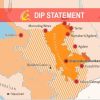Stop the adventurism in the Caucasus after that in the Eastern Mediterranean! NATO out of the Caucasus! The ultimate solution is the Federation of the Caucasus!
The Central Committee of DIP (Revolutionary Workers Party) convened over the weekend and adopted a statement on the war in Nagorno Karabakh. What follows is a shortened version of that statement, omitting the more contingent and transitory details and dwelling on the more structural and durable aspects of the question.
- On September 27-28, at first, with Armenia hitting regions controlled by Azerbaijan with cannon and mortar fire, followed by an all-out counter-attack by the Azerbaijan army throughout the whole frontline, the war was reignited and quickly escalated in Nagorno-Karabakh. We say the war was reignited because the war that had its first sparks during the period of decline of the Soviet Union in 1988, which then broke out in 1992 never ended in peace despite the ceasefire declared in 1994, and since then Nagorno Karabakh and its surrounding regions are still under siege by the army of Armenia.
- The toiling people of Turkey should not look at the war through the lens of the alliance between their own ruling classes and the oil rentier oligarchs of Azerbaijan. Because through this lens, one cannot see the immense struggle of the Armenian people against their despotic bourgeois regime, a regime quite similar to those in Turkey and Azerbaijan. On the Azerbaijani side, it is clear that the Azerbaijani people, whose share of the huge oil profits is merely poverty, are in a state of deep repulsion despite the heavy-handed repression of Aliyev despotism, even if that is expressed in a distorted bourgeois opposition of liberal pro-west parties on the one hand and nationalist ones on the other. Whether the peoples’ struggle for bread and freedom gets repressed as in Azerbaijan and in Turkey or gets derailed under a corrupt leadership (Pashinyan) after overthrowing a despotic oligarch (Sargsyan) as in Armenia in 2018, ultimately the interests of the toiling people are one and the same. Today the firestorm caused by the war serves to hide this fact. The ruling classes of Turkey and Azerbaijan, through the “two states, one nation” demagogy, use chauvinism in order to redirect the anger of the people they utterly exploit and oppress towards the Armenian people.
- For us, Armenia means the Armenian people who rebelled for bread and freedom in 2018. That people is our brothers and sisters. A century after 1915, it is clear that our most pressing responsibility as the vanguard of the working class of Turkey and as socialists is to fight against the chauvinism instigated against the Armenian people, before discussing the various military, political, diplomatic, and other issues. Because if we do not wage this fight despite all of its challenges, this war just like previous wars will end in some borders changed, resulting in a new balance of forces, but the working people will continue to feel enmity against each other and the ruling classes in each country will thus maintain their corrupt regimes bent on oppressing and impoverishing their people. The war of Nagorno Karabakh reignited in 2020 will not yield any different results under these conditions.
- Against the weakened but still continuing military and political influence of the Russian Federation in the region after the dissolution of the USSR, the influence of Western imperialism on Turkey and Azerbaijan as well as on Armenia through the Armenian diaspora in France and the USA has resulted in a certain balance. In this balance, Armenia was closer to Russia while Azerbaijan was closer to Western imperialism and Turkey. While Azerbaijan became part of GUAM which was founded in 1997 after the dissolution of the USSR by former Soviet republics now under the sway of Western imperialism, Armenia became part of the Collective Security Treaty Organization formed by countries under Russian influence such as Armenia, Kazakhstan, Kyrgyzstan, Tajikistan, and Belarus. Armenia also hosts a Russian military base in the city of Gyumri.
- Even though the Caucasus is still within the sphere of influence of Russia, we observe that the military development of Azerbaijan outpaced that of Armenia owing to Turkey and NATO. All of this makes Azerbaijan a prime candidate for NATO expansion in the Caucasus, immediately after Georgia. Furthermore, the fact that “Russian backed Armenian forces” is the prevalent propagandistic rhetoric in the Azerbaijani media and that similar expressions are uttered by the government in Turkey points to a desire to frame the war in Nagorno Karabakh as part of the Russia-NATO tension.
- On the other hand, the Azerbaijani minority in Iran has always been a topic of contention between these two countries. Israel exploits this fault line to develop closer ties with Azerbaijan, while Iran does the same with Armenia. Especially since 2014-2015, Israel has surpassed Russia, which had long been the main arms supplier in the region, in becoming the biggest arms supplier to Azerbaijan.
- In the past, Turkey refrained from opening up another front in the Caucasus while serious military tensions remained with Egypt and Russia in Libya, and with Greece and France in the Eastern Mediterranean, and while the Idlib front was still active; yet between July 13 (when there was a brief skirmish between Armenia and Azerbaijan) and September 27-28, Turkey largely pulled back from the Eastern Mediterranean, was forced to accept the ceasefire signed in Libya in spite of its wishes, put a stop to its contention with Greece in the Eastern Mediterranean by delegating it to NATO and finally pulled the Oruç Reis ship back to the Antalya harbor. As the retreat in the Eastern Mediterranean turned into a rout, the contradictions between Russia and Armenia were seen as a new opportunity. It seems that the Turkish government foresaw Russia would keep quiet if the Azerbaijani counterattack gained control of territories that did not go against the Minsk consortium’s peace framework.
- There are powers far away from the warzone that have very little to lose and a lot to gain. In particular British imperialism, which is virtually having a new cold war against Russia lately, can have such an inclination. Britain is strikingly the only state among Western powers that refrained from calling for a ceasefire in Karabakh. The US, which called for a ceasefire and restraint, does not perhaps wish to create a new conflict with Russia outside of its own initiatives, yet it should be kept in mind that it will approach this conflict within its framework of NATO expansion in the Caucasus.
- Israel is also rubbing hands and watching the war as the tension between Iran and Azerbaijan increases. It is also no secret to anyone that Turkey, which pulled a retreat in the Eastern Mediterranean, is trying to come up with a way to make a deal with Israel. Discussions surrounding the “normalization of relations with Egypt'' are constantly kept on the agenda by AKP politicians and their media as a prelude to the normalization of relations with Israel. It is quite telling that the relationship between Israel and Azerbaijan is not only not hidden from view but instead emphasized by columnists and commentators who are partisans of the AKP. It is not the first time that we witness the exploitation of racist and chauvinistic animosity against Armenians as a promotion of Zionism. The collaboration with the Zionist lobbies in the US and in Europe to reject Armenian genocide bills in parliaments is often discussed with immense praise. Finally, Israel is also one of the forces that are on the side of escalating the war to increase the tensions between Iran and Azerbaijan and to encourage the separationist tendencies in the Azerbaijani minority in Iran.
- There is nothing in the spectrum of possible results of a war between Armenia and Azerbaijan to the benefit of the working peoples of either country or those of other countries in the region. Turkey should not fan the flames. If Turkey transferred some of the mercenary forces in Syria to the Karabakh region or if Turkey is taking sides in the war by providing practical military support to Azerbaijan, it should immediately cease its activities. In this regard, there are serious contradictions among the official rejection of the allegations given to other states, on the one hand, and the comments of certain Syrian organizations to the media and the boastful propaganda running around circles close to political Islam, on the other.
- The reality of the new shackles put on the peoples of the Caucasus by great powers should direct us to search for the hints of a solution, if not the solution itself, in the century-long peace and calm in the region after the October revolution. Our past does not merely consist of enmity, massacre, and genocide! Let us not forget that from the “Liberty revolution” of 1908 in Turkey to the Baku Commune and thence to the Congress of the Peoples of the East, the peoples of Armenia, Turkey, and Azerbaijan have not just fought each other but also made revolutions together!
- Each turmoil in the vast landscape that includes the Caucasus morphed into national massacres within the Caucasus itself during modern history. This was so in the 1905 Russian revolution. In the months following the 1917 revolution, the revolutionary banner held up by the Baku Commune was tainted with blood from Armenian-Azerbaijani conflicts. Nakhchivan and Nagorno Karabakh always caused a problem between the two nations in the early Soviet period. As Gorbachev reforms loosened the political atmosphere, Sumqayit, Khojaly and Nagorno Karabakh exploded in conflicts one after another turning the Caucasus into a warzone. More than 30 years after the dissolution of the Soviet Union, the Armenia-Azerbaijan tension is still concealing all other political issues. The fact that none of the Turkish governments in the last quarter of a century managed to fix the relationships with Armenia is partly due to the paralyzing effect of the Armenia-Azerbaijan tensions. But in Anatolia, the problem is not just the Turkish-Armenian tensions. Part of the territory that is considered their homeland by the Armenians is also considered as such by the Kurds. Therefore, the same territory has three different conflicting claims on it. Likewise, the Azerbaijani Turkish minority in Iran is constantly provoked by imperialism and Zionism.
- A similar pattern is also observed in the Balkans and the Middle-East. National, ethnic, and sectarian fault lines cross the borders of the countries and by dragging the region into endless conflicts, put them permanently under the influence and interventions of imperialism. On the other hand, at the time of the existence of workers’ states in the Balkans and the Caucasus, the fact that the peoples that are presented today as enemies from time immemorial did, in fact, live together in federative structures and the existence of relative peace and calm despite many problems show us that the enmity among the peoples of the Balkans and of the Caucasus are neither perennial nor eternal. Therefore, the national problem along the Eastern Anatolia-Middle East- Caucasia line can only be solved through a federation. It is impossible to solve the ancient contradictions between Turkish (Azerbaijani) - Armenian - Kurdish and Farsi peoples in a just, permanent, stable manner when each of these is under independent nation-states. As shown by the massacres and struggles at least from 1894-96 onwards, these contradictions have a strategic character. The solution can only be found by the union of the peoples of the Caucasus under a socialist federation. This is the only path to a solution in the Balkans and the Middle-East as well for toiling people against imperialism and ruling classes.
- DIP (Revolutionary Workers Party), together with comrades from Azerbaijan and Iran, who are also in a drive to organize on a revolutionary Marxist basis, called for a “second Baku” less than a month ago on the occasion of the centenary of the Baku Congress of the Peoples of the East. That was a preliminary call for the collective organization of the working classes, peasantry, and the poor people of the Middle East and the Caucasus to collaborate on an internationalist basis. Our declaration stated: “The masses, the workers, the fellahin, the urban poor, and the youth have shown, again and again, that they are ready to struggle to bring down the hateful political regimes that repress the peoples of our region and the exploitative socio-economic order that impoverishes us by the day. It is up to us socialists, communists, revolutionaries to provide leadership to the masses that have risen. We need leadership not to lose these revolutions the next time around. There is a dire need for a consistent political leadership that receives its nourishment from Marxism.” The popular revolt ignited by the Gezi protests in Turkey, the 2018 popular revolt in Armenia, an unending stream of revolts, strikes, and struggles that had its peak in the November 2019 popular revolt in Iran, all failed to go forward due to the lack of a Marxist leadership and today we are paying for this with a chauvinist war that threatens to expand further. Once again we call all anti-imperialist and anti-chauvinist proletarian forces in every country in the region to take a step towards internationalist unity.
Central Committee of DIP
(Revolutionary Workers Party)
4 October 2020
|
|




